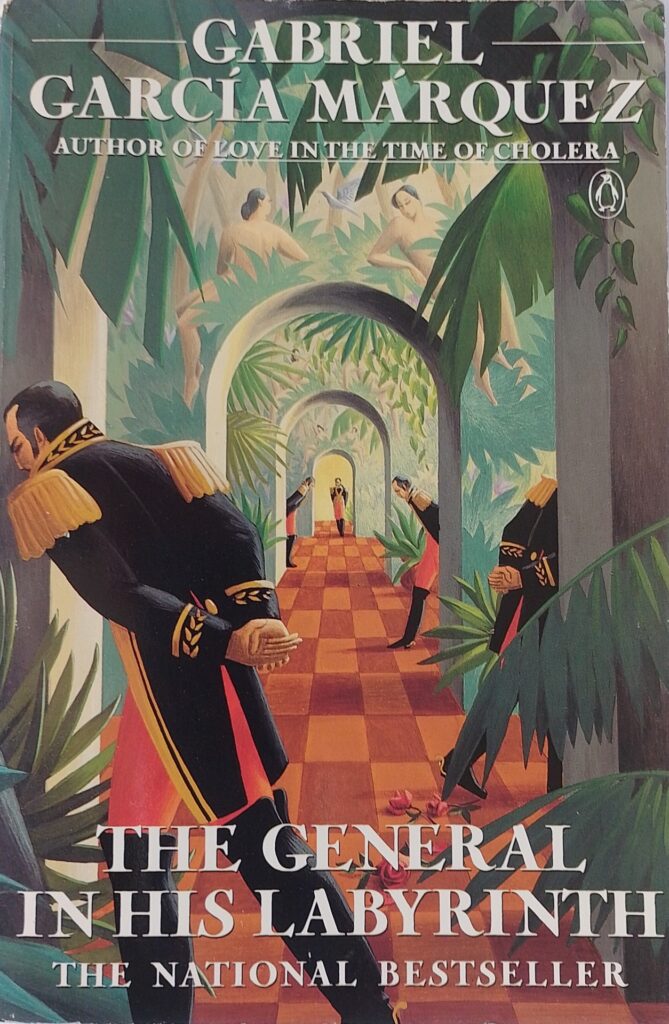First published 1990. Translated by Edith Grossman. Penguin paperback, 1991, pp285, c.75,000 words.
This is a fictional account of the last days of Simón Bolívar, the man who did much to drive the Spanish out of South America. For those of us who know little of the history of that part of the world it can get rather confusing with multiple generals sometimes agreeing and sometimes disagreeing with each other. That seems to have been Bolívar’s problem too. He had a vision of a single pan-southern and central American state, but others preferred a division into smaller states, so once the Spanish left, the locals fought amongst themselves.
Bolívar’s final journey was down the Magdalena river from what is now Bogotá to the Caribbean coast, where he was thought to be going into exile abroad. He was only forty-seven, but seemed old: he had become worn down emotionally and was physically unwell. Perhaps he was hoping to be called back to become president again, perhaps he hoped the people would rally to him and he could recapture Venezuela, or perhaps he really did intend to go into exile. From this account, he had no clear plan.
South America was left with a hugely problematic legacy once the Spanish had left. It was peopled by a powerful landed elite, primarily of European descent, a large, poor, disenfranchised native population, slaves working plantations that generated much of the surplus wealth, and a large pool of landless European immigrants and mixed-race peoples.
Bolívar came from the elite: his family owned a substantial estate and significant mining assets. Not surprisingly, he favoured a government based on the British model, with a permanently-entrenched, powerful voice for the elite. He had spent some of his youth being educated in Europe, but once he returned he soon became involved in the rebellion and was given a high rank. He comes across as an energetic, charismatic and moderately successful military leader, although he seems to have lost as many battles as he won. What marks him out was the simple fact that he survived, sometimes only narrowly. He was a great admirer of Napoleon, and fancied himself as the Spanish-American equivalent [p77]. He seems to have had something of the same self-centred arrogance, presumption and bad manners. His success as a military man didn’t reach the same heights.
The other aspect to Bolívar’s character was his legendary fondness for women and their apparent fondness for him. He had been married in his early twenties, but his wife had died of yellow fever after only six months, which seems to have made him averse to re-marriage, although he had several long-term mistresses and numerous dalliances according to legend.
Bolívar’s final journey was clouded by his failing health. He was still a copious letter-writer, trying to influence events as well as keeping up personal correspondence. He was accompanied by a large and loyal retinue, including his faithful man-servant, a cook who knew his tastes, and a large number of fellow officers as well as a guard of troops. He subjected himself to idiosyncratic health regimes and diets, but almost completely refused to see any doctors until it was far too late, and then he preferred the company of a good quack [p214].
Márquez wites in a relatively straight-forward style here. Sometimes the language seems a little simplistic [e.g. p200], but that may be more to do with the way Spanish translates into English, and not a fair reflection on Márquez.
This is no hagiography, but an attempt to see the whole real man. Told from Bolívar’s point of view, the linear journey is interspersed with some brief diversions into Bolívar’s past that help to illuminate the present. There are hints of magical-realism in that the women are all beautiful and the men either heroic or villains, servants and dogs are faithful, his horses are ‘epic’ [p25], and friends are loyal unto death. To be fair, Márquez does seem reasonably even-handed, and he lays out Bolívar’s faults as well as his virtues.
Even if one has little interest in the man or his place, Márquez is a good enough story-teller to retain the reader’s interest: what is going to be Bolívar’s fate? It also goes a little way to explain the divisions and political strife in Latin America that exist to this day.
Wikipedia biography of Márquez: https://en.wikipedia.org/wiki/Gabriel_Garc%C3%ADa_M%C3%A1rquez
Wikipedia summary of the book: https://en.wikipedia.org/wiki/The_General_in_His_Labyrinth
Others’ reviews of the book: https://www.goodreads.com/book/show/23884.The_General_in_His_Labyrinth?from_search=true&from_srp=true&qid=sRbx40g4ya&rank=1
© William John Graham, June 2024

